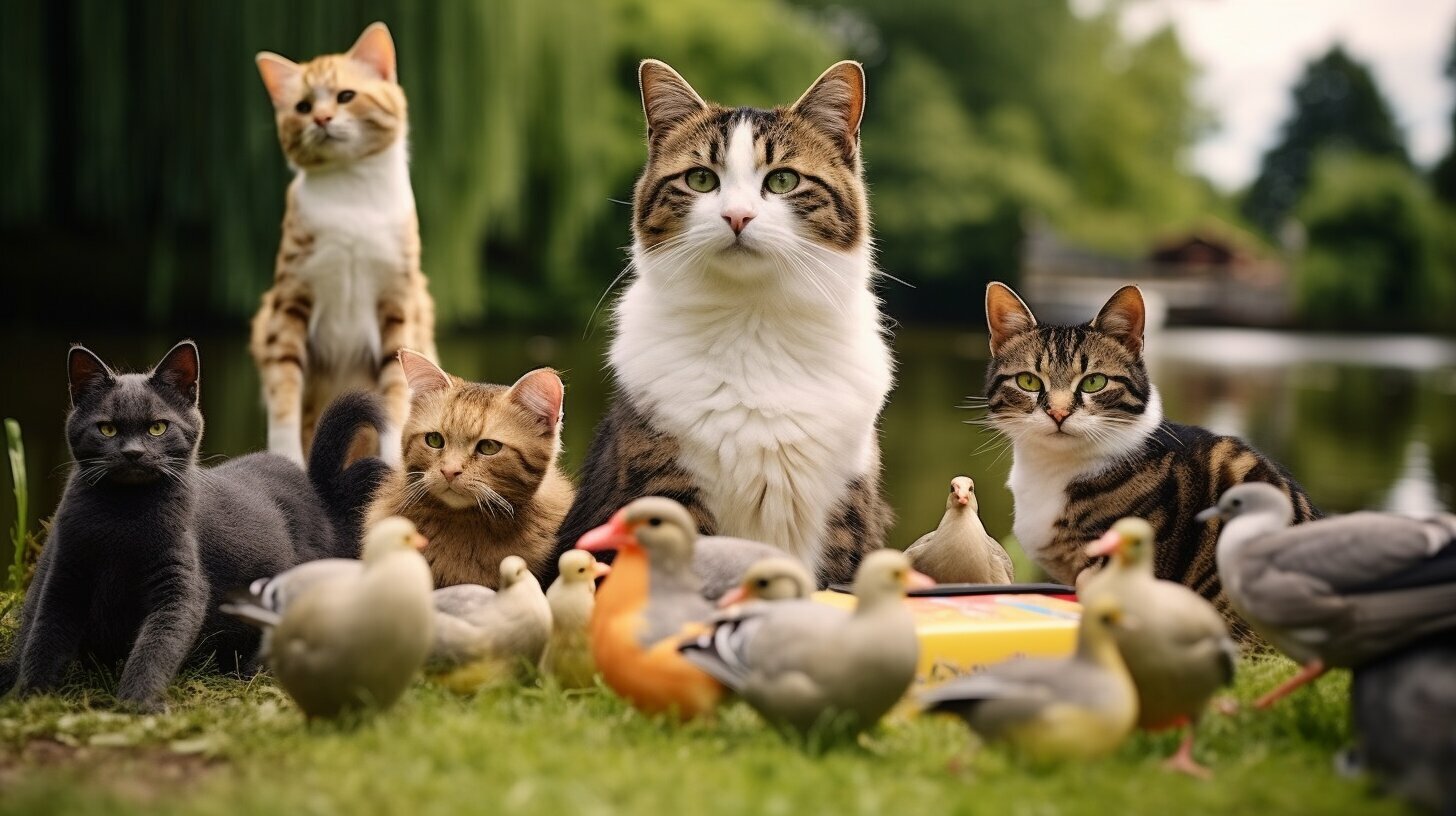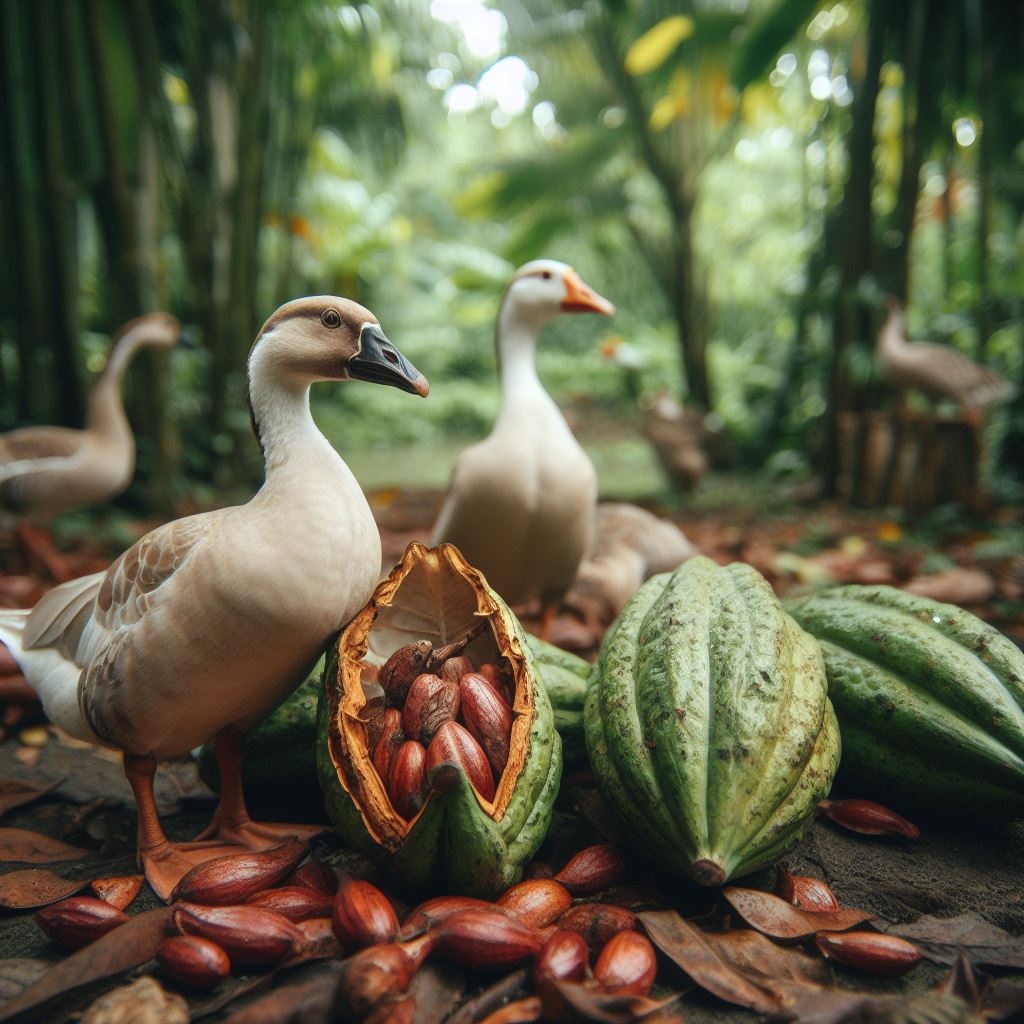Can Geese Eat Dry Cat Food? Unusual Choice

Table of content:
Can geese eat cat food? Geese are herbivores that have evolved to thrive on diets of grasses, aquatic plants, seeds, and grains. Their digestive systems are specially adapted to process high volumes of plant fibers. Geese also require balanced ratios of carbohydrates, vitamins, and minerals specific to their species.
On the other hand, cat food is formulated to meet the nutritional needs of carnivorous cats. It contains high amounts of animal proteins and fats along with vitamins, minerals, and nutrients tailored for cats. Feeding geese cat food can lead to serious dietary imbalances and health issues.
While geese can physically swallow the small dry pieces, cat food does not offer proper nutrition for geese. Read on to learn more about geese diets versus cat food ingredients and the risks of feeding geese inappropriate food.
Facts About Geese Diets
Geese are waterfowl that are closely related to ducks and swans. There are several species of geese around the world, but the most common in North America are Canada geese and domestic greylag geese.
Herbivorous Diet
All geese primarily eat plants and are herbivores. They have digestive systems adapted to efficiently break down and digest fibrous plant material. Geese do not have the short digestive tracts needed to process meat well.
In the wild, geese forage on land and in water for edible vegetation. Their diet consists of:
- Grasses
- Aquatic plants like seaweed or water hyacinths
- Seeds of wheat, rice, water plants
- Roots, rhizomes, bulbs
- Berries, soft fruits
Domestic geese thrive on diets of grains like wheat, barley, oats, corn, and rye. They also need access to grass or alfalfa for grazing. Supplementary vegetables, fruits, legumes can add variety.
Specialized Digestive System
Geese have digestive systems specially adapted for their fiber-rich, plant-based diets.
- They have strong muscular gizzards to grind up fibrous plant matter.
- Their intestinal tracts have fermenting chambers to break down cellulose and extract nutrients.
- Goose species do not produce salivary amylase to digest starches like carnivores.
- Instead, their intestines produce amylase to digest plant starches and carbohydrates.
Geese also need high volumes and frequent intake of food. Since plant material is less energy-dense than meat, geese have to consume a lot to meet their energy needs. They graze almost continuously during waking hours.
Nutritional Requirements
Geese require balanced nutrition to stay healthy like any animal. Key nutrients geese need include:
- Carbohydrates: Geese need high levels of carbohydrates for energy, which they get from grains and grasses.
- Fiber: Dietary fiber from plants keeps geese’s digestive system functioning properly.
- Protein: Geese need some protein to support growth and egg production, but excess can cause liver and kidney strain.
- Fat: Healthy geese have fat deposits to insulation and migrate. Too much rich fat can lead to obesity and liver disease.
- Vitamins/minerals: Geese need B vitamins, vitamin D, calcium, phosphorus and other minerals tailored to their physiology.
Foraging Behavior
In nature, geese spend much of their awake time grazing and foraging for edible vegetation. Domestic geese retain this need to constantly nibble and graze.
If geese are confined with insufficient grazing outlet, they may resort to overeating or consuming non-food objects to satisfy the desire to graze. Feeding them inappropriate but edible matter like cat food can also become a problem.
Facts About Cat Food
Cat food comes in dry kibble or canned wet varieties. It is formulated to provide complete, balanced nutrition for cats in an easy to eat and digest form. But the ingredients and nutrients are tailored specifically for carnivorous cats, not geese.
Nutritional Profile
Unlike geese, cats are obligate carnivores meaning they must eat meat. Cat food contains:
- High protein: Cat food contains very high levels of animal proteins from meat, poultry, fish, and eggs to meet cat’s needs.
- Animal fat: Cat food is high in animal fat to provide concentrated energy and fatty acids.
- Vitamins and minerals for carnivores: It is fortified with vitamins and minerals that match cats’ needs, which differ from herbivores.
- Little to no fiber: Cats do not need much dietary fiber, so most cat foods only contain 1-2% crude fiber.
Palatability
Dry cat kibble is made to be very palatable for fussy cats. The small, crunchy pieces contain:
- Savory animal flavors
- Aromatic extracts to entice cats
- Palatant oils for taste and texture
These qualities make dry cat food appealing to geese as well. Geese are tempted to peck and ingest the flavorful pieces.
Can Geese Eat Dry Cat Food? Risks Feeding Geese Cat Food
While geese will readily eat cat food, doing so can pose many health risks and issues for geese:
Nutritional Imbalances
Cat food does not have ideal macros for geese nutrition:
- Excess protein can overtax geese’s kidneys and liver. Geese need 10-20% protein while cat food contains 30-40% protein.
- Too little fiber leads to digestive issues. Geese need 15-25% fiber while cat food only has 1-5% crude fiber.
- Fat and carbs are improper ratios for geese. Geese need more complex carbs and less fat than carnivorous cats require.
Vitamin Toxicity or Deficiency
The vitamin/mineral mix in cat food does not match the needs of geese. Feeding cat food may lead to:
- Excess of some vitamins like Vitamin D causing toxicity.
- Deficiency of key geese vitamins like Vitamin E, A, and B-complex.
Obesity and Fatty Liver Disease
The high fat levels of cat food can quickly lead to obesity and liver problems in geese like:
- Fat deposits in the abdomen and liver.
- Liver enlargement, swelling, and dysfunction.
- Potentially fatal liver failure.
Other Health Issues
Further health risks of geese eating cat food include:
- Gout: Excess protein causes painful uric acid buildup in joints.
- Pancreatitis: High fat content can inflame the pancreas.
- Digestive illness: Vomiting, diarrhea, intestinal upset from dietary imbalance and lack of fiber.
- Immune deficiency: Nutritional deficiencies make geese prone to illnesses.
- Beak and foot deformities: Biotin deficiency can cause abnormal keratinization.
Behavioral Issues
If geese start eating cat food, they may become conditioned to aggressively seek it out. They can become habituated to non-species appropriate food to the detriment of their health.
Why Geese Should Not Eat Cat Food
here are the key reasons geese should never be fed cat food:
- Geese are herbivores adapted to digesting fibrous plant matter, unlike carnivorous cats.
- Cat food does not have the proper nutritional balance of protein, carbs, fat, and fiber geese require.
- Vitamins and minerals in cat food can cause toxicity or deficiency in geese.
- High protein and fat can overtax geese’s digestive and excretory systems.
- Serious health issues like gout, liver disease, pancreatitis can result from nutritional imbalance.
- Feeding geese cat food can reinforce bad begging behaviors.
Conclusion
Geese should be fed a species-appropriate diet of grains mixed with grass or hay for grazing. Poultry feed or waterfowl feed are good options that provide balanced nutrition. Any treats for geese like fruits should be given only in moderation.
Cat food, whether dry kibble or canned/pouched, should never be fed to geese intentionally. The risks to geese health are too high. While geese will eat cat food, pet owners should take care to keep it out of reach of local geese. With proper measures, we can keep geese healthy and avoid enabling poor begging habits.
Welcome. I’m Adreena Shanum, the proud owner of this website, and I am incredibly passionate about animals, especially poultry. I founded adreenapets.com as a labor of love, stemming from my desire to share my knowledge and experiences with poultry enthusiasts worldwide.




